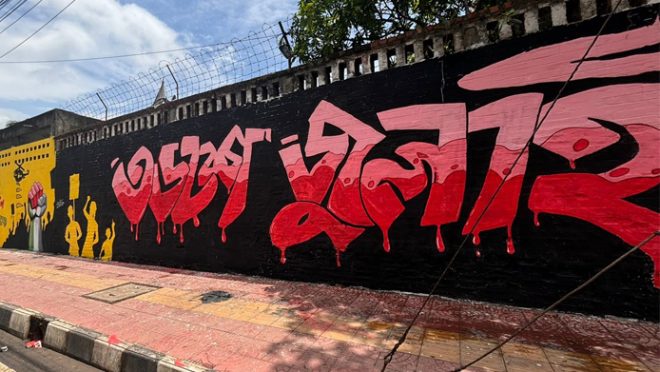The birth of 36 July 2024: A new chapter in history
The birth of 36 July 2024: A new chapter in history

I along with my family participated in the historic Long March to Dhaka on 36 July 2024 (5 August), which opened a new front in Bangladesh’s quest for justice. The air was heavy with a mixture of optimism and terror as we went from Mohammadpur to Shahbagh and then to Ganobhaban again.
It was both humbling and motivating to see millions of people calling for the resignation of the government.
Every move we made seemed like a step closer to a Bangladesh that is more just and free. My anxieties were dispelled and were replaced with a strong sense of purpose and determination by the unyielding solidarity and unrelenting energy of those around me. This was more than a protest; it was the embodiment of our collective resolve to end tyranny and reclaim our democracy.
The “Long March to Dhaka” that took place on 5 August 2024, represents a historic turning point in Bangladeshi history. This demonstration, which was sparked by the students’ opposition to the quota system, became a national call for the resignation of the ruling administration and a significant turning point in the country’s struggle for justice and democracy. Motivated by unrelenting persecution and mass killings carried out by the government and allied forces, this movement has become a pearl in the sea of time like the most significant moments in Bangladesh’s liberation history, such as the Language Movement of 1952 and the Liberation War of 1971.
The red month that led to 36 July 2024
People have coined the term 36 July commemorate 4 August in honor of the unyielding spirit of a nation drenched in the blood of its people.
The protests that began on 1st July against the Quota System quickly escalated into a full-blown struggle for justice, as the ruling government responded with brutal oppression, mass killings, and midnight arrests of students, teachers, and supporters. Each day of July saw relentless violence and betrayal, with the streets running red with the blood of unarmed protestors, including children and common citizens. This prolonged period of terror extended beyond the conventional calendar, necessitating the creation of a symbolic date that encapsulated the unbroken chain of sacrifice and resistance. Thus, 5th August was christened as the “36th July,” a poignant reminder of the 36 days of relentless bloodshed and the indomitable will of the Bangladeshi people to stand united against tyranny.
Historic transformation
Due to the harsh suppression by the ruling administration, the quota reform protests that started on 1 July 2024, soon developed into a nine-point movement. The killings of defenseless people and students by the government, indirectly terming them as “Razakar” (traitor), and arresting educators and supporters in the dead of night only fuelled the unrest. The campaign developed into a set of nine demands, which finally came to represent one single, unwavering demand: the resignation of the government. The protest’s transformation demonstrated the populace’s growing ire and resolve to put an end to oppression.
Unifying force
The Bangladeshi people’s tenacity and togetherness were amply demonstrated by the Long March to Dhaka. Millions marched towards Ganobhaban from Shahbagh and beyond, all with the same goal in mind. In a historic show of unity, students, kids, elders, freedom warriors, and regular people came together. This movement was a national rebellion against oppression, injustice, and the betrayal of democratic ideals, not only a protest movement. It demonstrated the might of a country resolved to recover its liberties and rights.
International solidarity and support
Unflinching support of the Bangladeshi diaspora and the world media played an important role in reaching the goal. The international attention given to the government’s abuses as well as the support of expats and remittance fighters helped the protest gain traction. This global backing strengthened the movement’s appeal to people everywhere and increased its influence on the international scene.
New era of freedom
Bangladesh’s triumphant Long March to Dhaka heralds the start of a new era. The people’s tenacious resolve is demonstrated by their victory over a totalitarian government that pretended to be democratic. Along with defending free speech, the movement has upheld the people’s sovereignty and right to an equitable and democratic government. This triumph pays homage to the martyrs’ sacrifices and the fortitude of the common people, who united against oppression.
The historic Long March to Dhaka on 36 July 2024, completely changed the course of Bangladesh’s history. It was a large rally, more cohesive, and significant than any earlier movements in the history of our nation. The unwavering spirit of the Bangladeshi people and the lasting power of collective action are demonstrated by this movement, which is the greatest of all. This triumph will serve as a ray of hope and a constant reminder of the strength of justice and solidarity as the country progresses.


